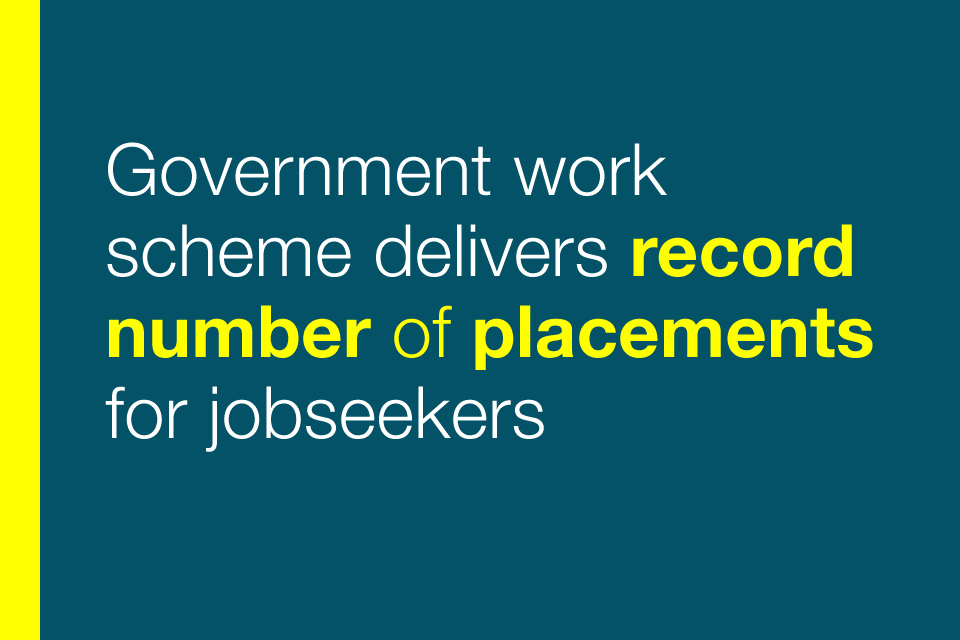


Part of the Government’s plan to help people back to work and grow the economy, Sector-based Work Academy Programmes (SWAPs) help benefit claimants move off welfare and into work by providing tailored training and work experience before a guaranteed job interview. Businesses who are actively hiring help craft these six-weeks on-the-job programmes, so that participants gain the right experience and skills for their roles.
The latest figures published this week show that in the last year 98,710 places were delivered – the highest annual figure yet. It brings the total number of SWAP starts to 283,930 – in sectors ranging from coding to hospitality, construction, health and social care.
It comes in the week that the Government’s NICs cuts worth £900 to the average worker hits pay packets as part of the plan to cut taxes, grow the economy and build a brighter future for hard-working families.
Backed by industry giants such as UKHospitality, the British Chamber of Commerce and Business in the Community, alongside household brands like Amazon, JD Sports and Lidl, jobseekers leave SWAPs work ready as they apply for live job roles.
The milestone follows the Government’s bold new vision for welfare, with the Prime Minister outlining reforms to tackle inactivity as we give more Brits the skills and support to get back into work as we bring down migration levels.
Secretary of State for Work & Pensions, Mel Stride MP said:
Our Jobcentres are a proven route to changing lives through work and the learning and upskilling opportunities they provide are second to none.
As part of our plan to build our new welfare settlement for Britain and grow the economy, this major milestone helps people get on with the skills they need to secure a great job, a higher wage, and a brighter future for their family.
After the Prime Minister announced the accelerated rollout of Universal Credit last week, together with increases to the Administrative Earnings Threshold (AET), even more claimants will benefit from the dedicated employment support offered through our Jobcentres.
This includes all the programmes under the Department for Work and Pensions’ (DWP) £2.5bn Back to Work Plan, which is set to help over a million people, including those with long-term health conditions to break down barriers to work.
Keith, 47, from St Austell was looking to change careers after he finished a previous role.
Keith said:
I was very interested in getting into Mental Health Care, but I had no qualifications or experience in the area. My Work Coach Tom was really supportive and told me how I could get experience in the sector through a SWAP with the NHS.
The SWAP opened my eyes to the type of roles available within the NHS and gave me the confidence I needed to kickstart my new career. I’m now working as a Developmental Mental Health Assistant and cannot believe I’ve reached my dream of working in Mental Health so quickly with the help of SWAPs.
Whether it’s someone’s first job or a career change, jobseekers of any age and experience can access invaluable work experience through SWAPs for a role actively being recruited for.
Andrew Bush, CPO of Greene King, said:
We were really pleased to be part of the sector-based work academy in partnership with the Department for Work and Pensions and other hospitality employers.
Through collaboration, we were able to create a programme that gave candidates a greater insight into our exciting industry, providing opportunities for many to achieve a fulfilling career in hospitality.
The Government is taking the long-term decisions to ensure the resilience of the UK’s labour market, building a strong economy where hard work is rewarded and where everyone has a brighter future.
Alexandra Hall-Chen, Principal Advisor for Employment and Skills with the Institute of Directors said:
At a time when many businesses are struggling to recruit the skills they need, SWAPs provide a valuable means by which employers can tap into a wider pool of candidates.
By providing jobseekers with support and training targeted at key sectors, SWAPs are a key tool in tackling both skills shortages and barriers to employment.
This includes:
40,670 for over 50’s